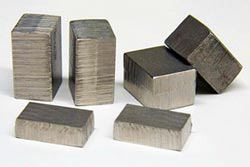Materials that shrink when heated

Samples of Invar. Also known as FeNi36, it is an iron-nickel alloy notable for its lack of expansion or contraction with temperature changes. Copyright : Public Domain<br>
One common reason that people with fillings experience toothache is that their fillings expand at a different rate to the original tooth when, for example, drinking a hot drink. Contrary to intuition, however, not all materials expand when heated—some actually contract. Recent research on these so-called negative thermal expansion (NTE) materials has led to the discovery of alloys exhibiting unexpectedly large thermal contraction.
Controlling the thermal expansion of composites is important for producing nanometer-scale electronic circuits, as well as the next-generation fuel cells and thermoelectric devices. An ability to combine NTE materials with ‘normal’ materials which expand upon heating ensures a reduction in thermal expansion in a composite material – something that people with tooth fillings would appreciate. An example of such a composite is Invar, an iron-nickel alloy with a uniquely low coefficient of thermal expansion. As a result it is used where high dimensional stability is required, such as precision instruments, clocks or seismic creep gauges.
Koshi Takenaka at the Department of Crystalline Materials Science, Nagoya University in Japan works on NTE materials for practical applications. In the latest issue of Science and Technology of Advanced Materials (link below) he summarizes the physical mechanisms governing NTE with emphasis on recent developments.
Takenaka notes that, “NTE materials will expand our capability of thermal-expansion control, opening a new paradigm of materials science and technology thermal-expansion-adjustable composites”. One challenge facing the scientist is that the addition of NTE materials to composites leads to undesirable instabilities at interfaces. New methods for producing stable interfaces between the host composite and NTE compensators are of critical importance. Nevertheless, the so-called ‘one-component’ materials—such as manganese antiperovskites, zirconium vanadates, and hafnium tungstates—exhibiting negligible thermal expansion offer a promising route towards achieving this goal.
Related information
[1] ‘Negative thermal expansion materials: Technological key for control of thermal expansion’ by Koshi Takenaka, Science and Technology of Advanced Materials Vol. 13 (2012) 013001. http://iopscience.iop.org/1468-6996/13/1/013001
Affiliation: Department of Crystalline Materials Science, Nagoya University, Nagoya 464-8603, Japan
Media contacts:
Mikiko Tanifuji
National Institute for Materials Science, Tsukuba, Japan
Email: stam_office@nims.go.jp
Tel. +81-(0)29-859-2494
Media Contact
More Information:
http://www.nims.go.jpAll latest news from the category: Materials Sciences
Materials management deals with the research, development, manufacturing and processing of raw and industrial materials. Key aspects here are biological and medical issues, which play an increasingly important role in this field.
innovations-report offers in-depth articles related to the development and application of materials and the structure and properties of new materials.
Newest articles

Zap Energy achieves 37-million-degree temperatures in a compact device
New publication reports record electron temperatures for a small-scale, sheared-flow-stabilized Z-pinch fusion device. In the nine decades since humans first produced fusion reactions, only a few fusion technologies have demonstrated…

Innovative microscopy demystifies metabolism of Alzheimer’s
Researchers at UC San Diego have deployed state-of-the art imaging techniques to discover the metabolism driving Alzheimer’s disease; results suggest new treatment strategies. Alzheimer’s disease causes significant problems with memory,…

A cause of immunodeficiency identified
After stroke and heart attack: Every year, between 250,000 and 300,000 people in Germany suffer from a stroke or heart attack. These patients suffer immune disturbances and are very frequently…





















